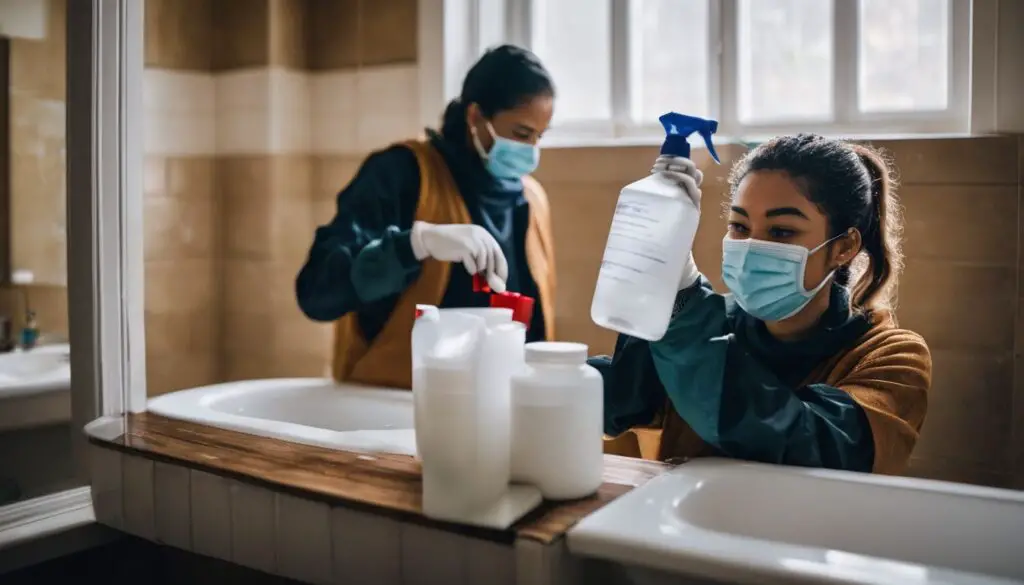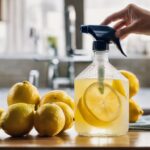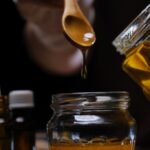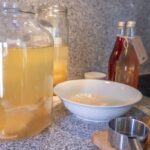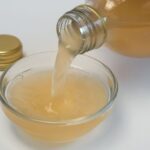Mold, a type of fungi that thrives on moisture, can pose serious health risks and even damage your property.
Can vinegar clean mold? Yes, vinegar is a potent agent against mold. Derived from natural sources, vinegar offers a safer alternative to chemical-based mold removers. In fact, vinegar has demonstrated strong antifungal and antibacterial properties effective in eliminating 82% of known molds. Its inherent antifungal properties allow it to combat and eradicate many common molds effectively. Not only does it address the mold you see, but it also penetrates to tackle mold at its roots.
Curious about how this household staple can be your mold-fighting hero? Dive in to discover more and harness the power of vinegar for safe, natural mold removal.
Key Takeaways
- Vinegar has antifungal and antibacterial properties that make it effective in killing mold, eliminating about 82% of known molds.
- Unlike bleach, vinegar can penetrate deep into the roots of the mold to fully eliminate it.
- Vinegar can also prevent future growth of mold by inhibiting the growth of mold spores.
- However, vinegar should not be used on porous materials like wood or concrete as it may cause discoloration or damage.
Understanding Mold Growth and its Dangers

Mold can grow almost anywhere. It likes damp, warm places. Most types of mold are bad for your health and some can hurt your home too. Mold gives off tiny spores that float in the air.
You can breathe them in without knowing it.
The mild acid in vinegar kills about 82% of known molds. That’s a lot! Vinegar is more powerful than bleach at finding and getting rid of mold roots under the surface. Cleaning experts even say use vinegar to kill mold better than bleach.
Health problems from mold include allergies, asthma attacks, and lung infections for people who have weak immune systems – like old people or sick people. Some kinds of black mold release poisons into the air which cause serious sicknesses if breathed in over time.
Vinegar is safe to use on many things around the house including most clothes, floors and walls. But, you should not use it on wood or concrete because these materials don’t deal well with any kind of acid, including vinegar.
The Effectiveness of Vinegar in Killing Mold
Vinegar’s antifungal and antibacterial properties make it an effective treatment for killing mold, although it may act slowly.

Vinegar’s antifungal and antibacterial properties
Vinegar has special properties that can help get rid of mold. It has natural antifungal and antibacterial abilities, meaning it can fight against the mold and kill it. Vinegar is a cheap and effective way to clean mold because it contains mild acid that can kill about 82% of different types of molds.
Unlike bleach, which only kills surface mold, vinegar can penetrate deep into the roots of the mold to eliminate it completely. This reduces the chances of the mold coming back in the future.
Plus, using vinegar is safer than using bleach since it is less toxic. So if you have a mold problem, consider using vinegar as a natural and effective solution.
Slow acting but effective

Vinegar may take some time to fully eliminate mold, but it is still an effective solution. Its antifungal and antibacterial properties work to kill mold slowly over time. While vinegar’s action may not be immediate, it can effectively get rid of mold at its root, reducing the chances of future growth.
This slow and steady approach makes vinegar a reliable option for removing mold and preventing its return without harsh chemicals or toxins.
Can prevent future growth

Vinegar not only kills mold, but it can also prevent future growth. Its antifungal properties help inhibit the growth of mold spores, reducing the chances of it coming back. By using vinegar as a cleaning solution regularly, you can keep your home mold-free and maintain a healthy environment.
So, in addition to being an effective treatment for existing mold, vinegar is also a great preventive measure to ensure that mold does not return in the future.
How to Use Vinegar to Clean Mold

To effectively use vinegar to clean mold, take necessary safety precautions and follow these simple steps.
Safety precautions

Using vinegar as a mold cleaning agent is both effective and eco-friendly. However, while it’s a natural solution, it’s essential to approach the cleaning process with caution. Here are some safety measures to keep in mind:
- Personal Protection: Always wear protective gloves and a mask to prevent direct exposure to mold spores.
- Ventilation: Ensure proper airflow by opening windows and doors during the cleaning process.
- Application Method: Use a spray bottle or sponge for applying vinegar. Gently scrub the mold-affected areas.
- Avoid Mixing: Do not combine vinegar with other cleaning agents or chemicals to prevent the release of harmful fumes.
- Material Testing: Since vinegar can discolor certain materials like wood and fabrics, always test on a hidden spot before full application.
- Seek Expertise: For severe or widespread mold issues, it’s advisable to consult professionals instead of relying solely on DIY methods.
While vinegar is a potent tool in the fight against mold, ensuring safety during its application is paramount. By following these precautions, one can effectively and safely harness the power of vinegar for mold removal.
Steps to take

To effectively use vinegar to clean mold, there are a few steps you should take. First, make sure to wear protective gloves and goggles to avoid direct contact with the mold and any potential spores.
Next, mix equal parts white vinegar and water in a spray bottle. Spray the affected area generously with the vinegar solution, making sure to thoroughly saturate the moldy surface.
Allow the vinegar solution to sit on the mold for at least an hour or overnight for better results. Afterward, scrub the area using a brush or sponge to remove any remaining mold residue.
Alternative methods to consider

While vinegar stands out as a popular and effective solution for mold removal, it’s not the only option available. Diverse methods, both natural and commercial, can be employed to tackle mold issues. Let’s delve into some alternative mold remediation techniques:
- Tea Tree Oil: Recognized for its natural antifungal and antibacterial properties, tea tree oil can be a potent mold killer.
- Hydrogen Peroxide: With its robust antimicrobial attributes, hydrogen peroxide serves as another effective mold removal agent.
- Baking Soda Solution: A mixture of baking soda and water can not only help in removing mold stains but also in absorbing excess moisture.
- Commercial Products: The market offers specialized mold removal products designed to combat and prevent mold growth effectively.
Choosing the right method for mold removal is crucial. Whether you prefer natural solutions like tea tree oil or commercial products, it’s essential to select a technique that aligns with your needs and ensures the effective elimination and prevention of mold.
Where NOT to Use Vinegar for Mold Removal

Avoid using vinegar on porous materials such as wood or concrete, as it can potentially cause discoloration and stains.
Potential damaging effects

Using vinegar to clean mold can have some potential damaging effects. While vinegar is generally safe and non-toxic, it’s important to note that the acid in vinegar can cause discoloration or damage certain surfaces, such as natural stone countertops or grout.
Additionally, vinegar may not be strong enough to completely eliminate deeply embedded mold on porous materials like drywall or fabric. In these cases, seeking professional help may be necessary to ensure proper removal of the mold and its spores.
It’s always important to test a small inconspicuous area before using vinegar on any surface, and if unsure, consult with an expert for guidance.
When to seek professional help

Mold infestations can range from minor issues to severe problems that compromise the health and safety of a household. While DIY methods can address minor mold concerns, there are situations where expert intervention becomes essential. Here’s when you should consider seeking professional assistance:
- Extent of Infestation: If mold covers a vast area or spreads across multiple rooms, it’s a clear sign that professional help is needed.
- Expertise and Equipment: Mold remediation specialists possess the necessary skills and tools to tackle severe mold infestations safely.
- Comprehensive Assessment: Professionals can determine the severity of the problem, pinpoint underlying causes of mold growth, and suggest appropriate solutions.
- Health Concerns: If mold exposure is causing health issues or if there’s uncertainty about the mold’s impact on health, it’s advisable to consult experts.
- Uncertainty in DIY Remediation: If you’re unsure about the correct procedures or methods to address mold, it’s best to rely on professionals.
Tackling mold infestations requires a strategic approach. While minor issues can often be addressed independently, severe or widespread mold problems warrant the expertise of mold remediation specialists to ensure a safe and thorough resolution.
Preventing Mold Growth and Maintenance Tips

Proper ventilation, regular cleaning and maintenance, and other effective mold prevention methods should be implemented to prevent the growth of mold.
Proper ventilation

Proper ventilation is crucial in preventing mold growth in your home. Good airflow helps to minimize moisture, which is a common trigger for mold. By opening windows or using fans, you can improve air circulation and reduce humidity levels.
Additionally, using exhaust fans in areas prone to moisture accumulation, such as the bathroom and kitchen, can help remove excess humidity and prevent mold from taking hold. Proper ventilation not only keeps your home fresh but also creates an environment that discourages mold growth.
Regular cleaning and maintenance
Maintaining a clean and dry environment is essential in safeguarding your home against mold infestations. As mold predominantly thrives in damp conditions, it’s imperative to adopt a proactive approach. Here are some key strategies to consider:
- Routine Cleaning: Engage in regular dusting, vacuuming, and mopping to eliminate potential mold spores and focus on keeping the environment dry to deter mold growth.
- Special Attention Areas: Prioritize moisture-prone areas such as bathrooms, kitchens, basements, and attics.
- Address Water Issues: Promptly repair any leaks or water damage and ensure areas of water spillage or accumulation are dried quickly.
- Ventilation: Ensure good air circulation throughout the home, utilizing exhaust fans or opening windows to reduce humidity, especially in moisture-prone areas.
By integrating these regular cleaning and maintenance practices, homeowners can effectively reduce the risk of mold growth, ensuring a healthier living environment.
Other effective mold prevention methods
Mold infestation in homes is a common issue that can lead to various health and structural problems. Effective prevention is the best approach to ensure a mold-free environment. Here are some essential methods to consider:
- Proper Ventilation: Ensure your home has adequate air circulation. This can be achieved by:
- Opening windows regularly.
- Using fans to promote airflow.
- Regular Cleaning: Focus on areas that are more susceptible to moisture:
- Bathrooms and kitchens should be cleaned and maintained regularly.
- Address any water spillage or leaks promptly.
- Humidity Control: High humidity levels can promote mold growth. To manage this:
- Use dehumidifiers in damp areas of your home.
- Monitor humidity levels and aim to keep them low.
- Leverage Vinegar’s Properties: Remember, vinegar’s natural antifungal abilities can be an added defense against mold, ensuring a safer environment for your household.
Preventing mold growth is crucial for maintaining a healthy living environment. By implementing these methods and utilizing natural remedies like vinegar, homeowners can effectively combat and prevent mold infestations.
So, Can vinegar clean mold?

In conclusion, vinegar can indeed clean mold. With its antifungal and antibacterial properties, vinegar is a powerful and effective treatment for mold removal. It may take some time to work, but it can kill mold at the root and prevent future growth.
Remember to use vinegar safely and consider seeking professional help for large or severe mold infestations.
FAQs
1. Can vinegar clean mold?
Yes, vinegar can kill mold at the root. It is a cheap and less toxic option than bleach.
2. How does vinegar work to remove mold?
Vinegar’s natural antifungal and antibacterial properties help to inhibit mold growth, making it an effective agent for cleaning wood and concrete molds.
3. What are the benefits of using vinegar to kill mold?
The main benefit of using vinegar for removing mold is its natural composition with no harm to health or environment.It also prevents future growth by killing spores.
4. Is using vinegar as a cleaner for molds eco-friendly?
Yes, Vinegar is an ecofriendly solution because of its natural antifungal properties against mold which make it safe for both users and the planet.
5. How can one use vinegar in cleaning molds?
To use as a nontoxic cleaner, cover the entire molded area with pure white distilled Vinegar that has been set aside for some time then rinse off after about an hour.

As a dedicated mother and passionate software developer, she weaves her diverse experiences into captivating stories that inspire and engage readers. Emma's love for sustainable living and environmental consciousness permeates both her personal and professional life. When she's not immersed in the world of coding and software development, Emma can be found nurturing her family and tending to her thriving organic garden. Her commitment to sustainable practices extends to every aspect of her life, from repurposing household items to embracing eco-friendly technologies.

